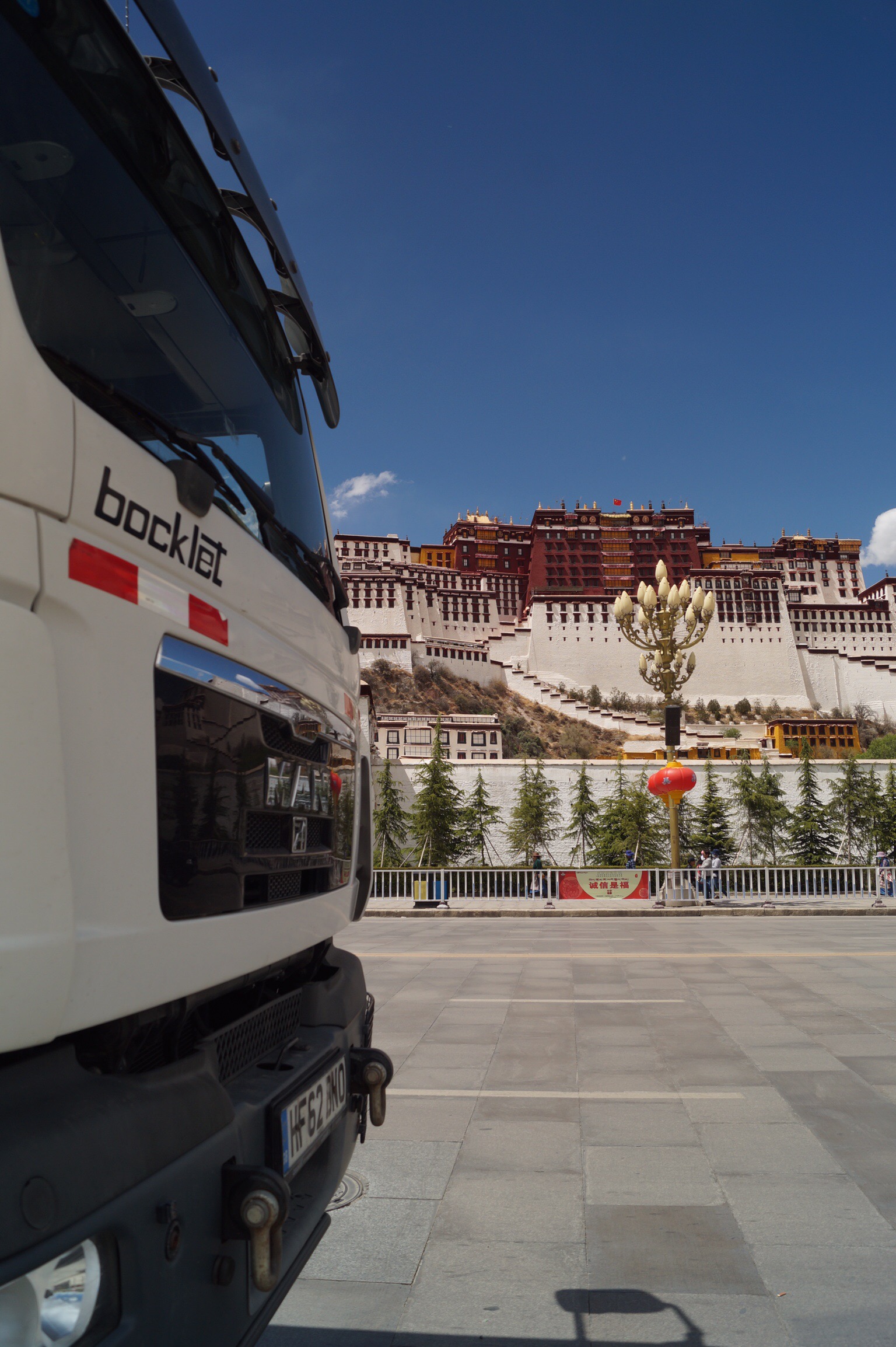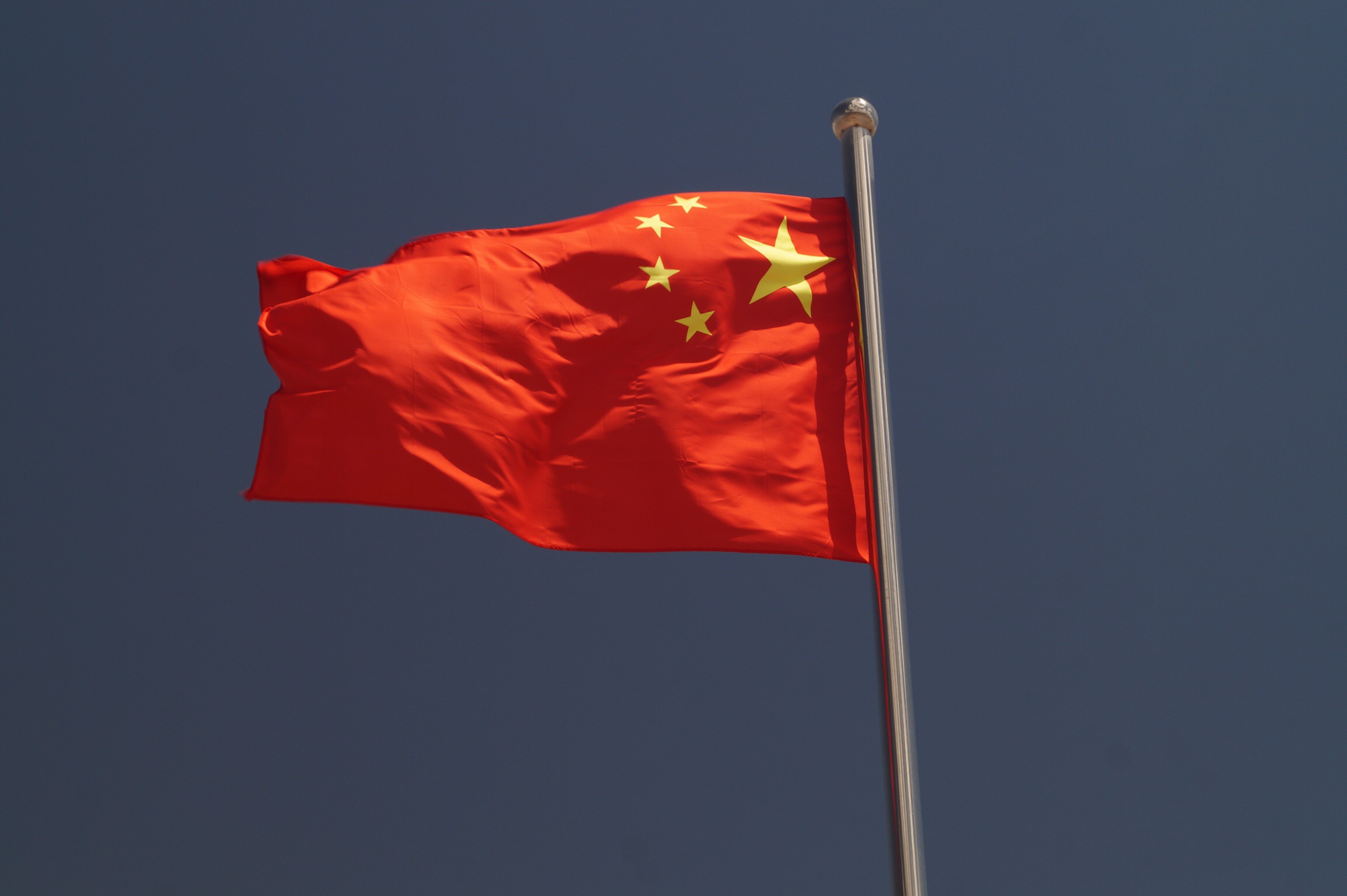 Lucy
Lucy
We entered China a month ago but me, Alisha and mummy had to wait two days for Daddy to arrive with the truck from the border. We left to go to Tibet and had to have guides all the way. We all got a bit sick from the altitude but we soon adjusted.
We went to see the Potala Palace it was very very big and there were lots of thrones for the Dalia Lama. We also went to Everest Base Camp where there was a great view of Everest.
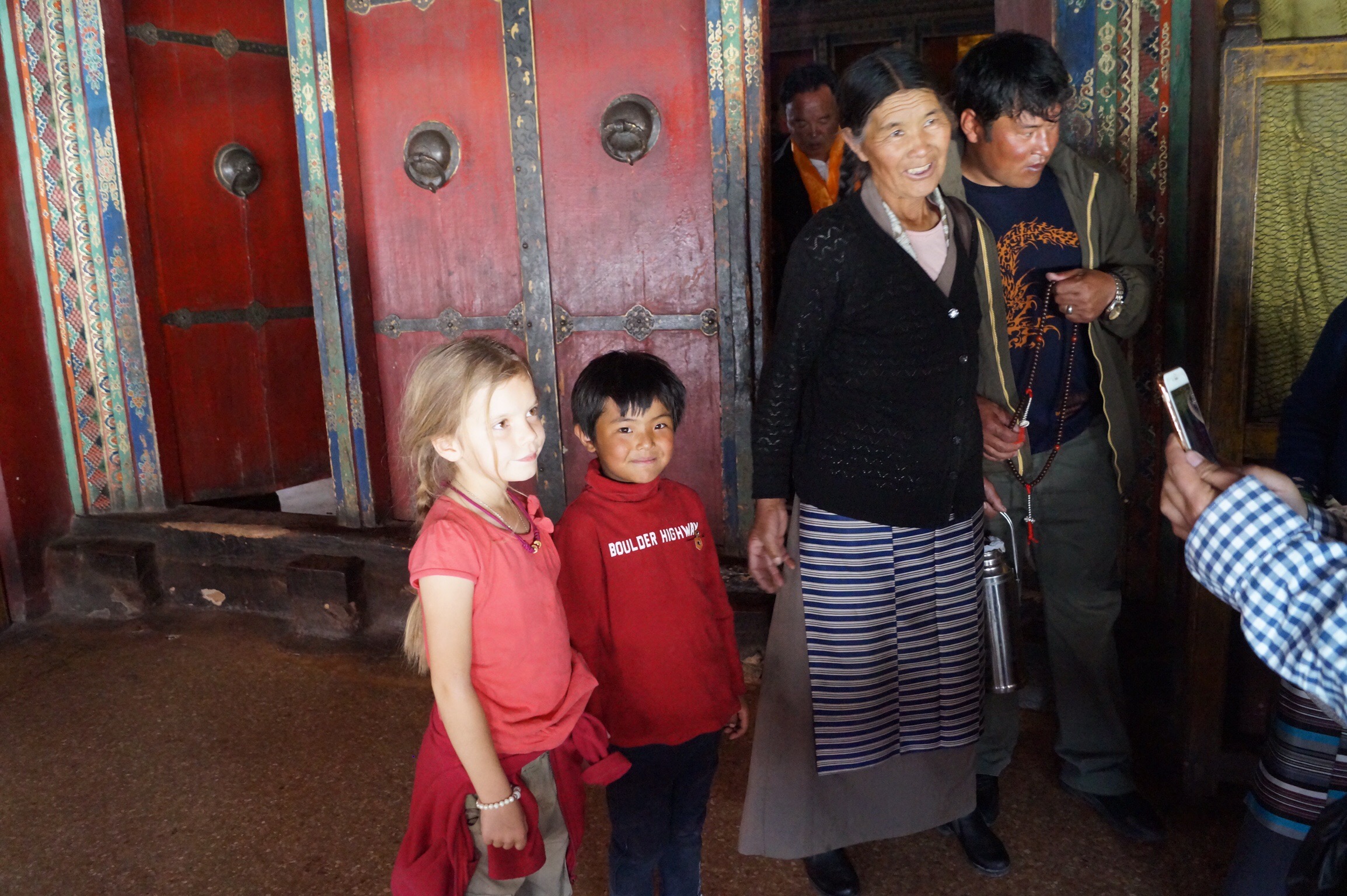
When we arrived in Kashgar we went to see the animal market, there were goats, cows,sheep, horses and donkeys and just as we were leaving camels came in.

The best part of the trip was the beautiful mountains and no matter how difficult the day was I could always see a lovely mountain even if it was just in my mind's eye.
Alisha
I liked China although we didn't see much of it. It would take you years to see all of it and to be honest I'm not sure Daddy would be able to cope with guides the whole way. We did a really long drive to get to Tibet as we had guides the whole way. I had to go and sit in the back which I soon got used to.
When we got to altitude all the sealed food puffed up. Some of the stuff got so puffed it took up all the space as soon as we got down though every thing puffed down and caved in.
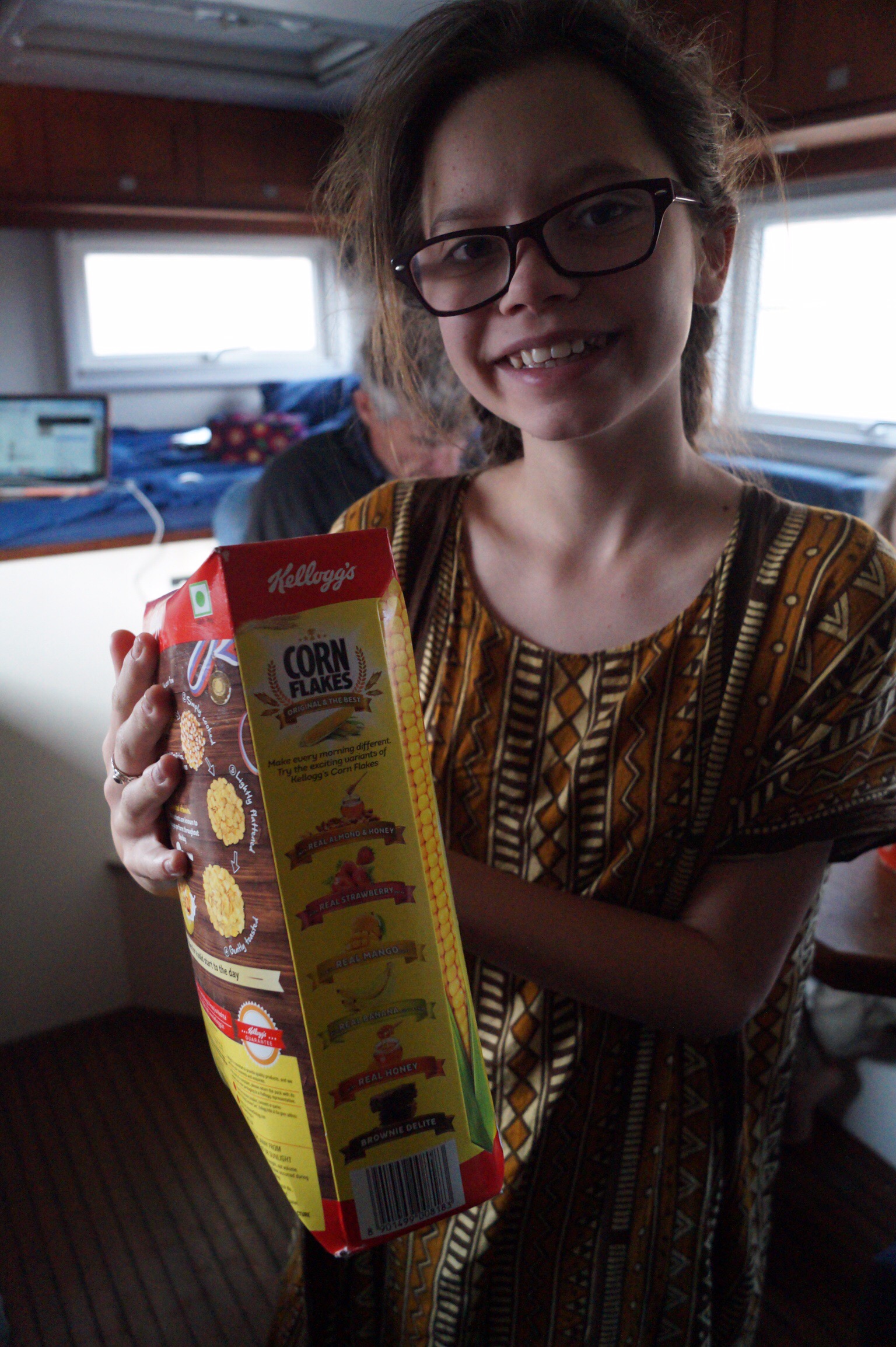
In Tibet there was a lot of yak butter lamps me and Lucy joked that they smelled of cauliflower cheese, it got a bit overpowering in the Jokhang temple.

I really enjoyed seeing the Potala Palace as well as the high mountain scenery and it was really cool (literally) to see Everest so close up.
Gilly
Having come from such a privileged country, I have to say I had rather taken democracy for granted. However after a month in Xinjiang and the Tibetan Autonomous Region, I will never take it for granted again. Kashgar felt like, how I imagine, a city under occupation would feel. There were police posts on every corner; our hotel had an army personal carrier primed and standing to attention outside; there were passport and bag searches to go into shops; heavily armed policemen standing alert in groups all facing outwards ready for action while people tried to go about their normal business around them; and citizens armed with clubs and nasty multi-spiked metal spears doing aggressive drills while being checked by the police. We saw multiple shows of force by the army and police throughout Xinjiang, all the traffic would be stopped and armoured cars; troop carriers bristling with machine guns rode around town with sirens blazing; and battalions of police dressed for battle with machine guns, riot shields and helmets faces hard matched through the streets ready to battle with an invisible enemy.
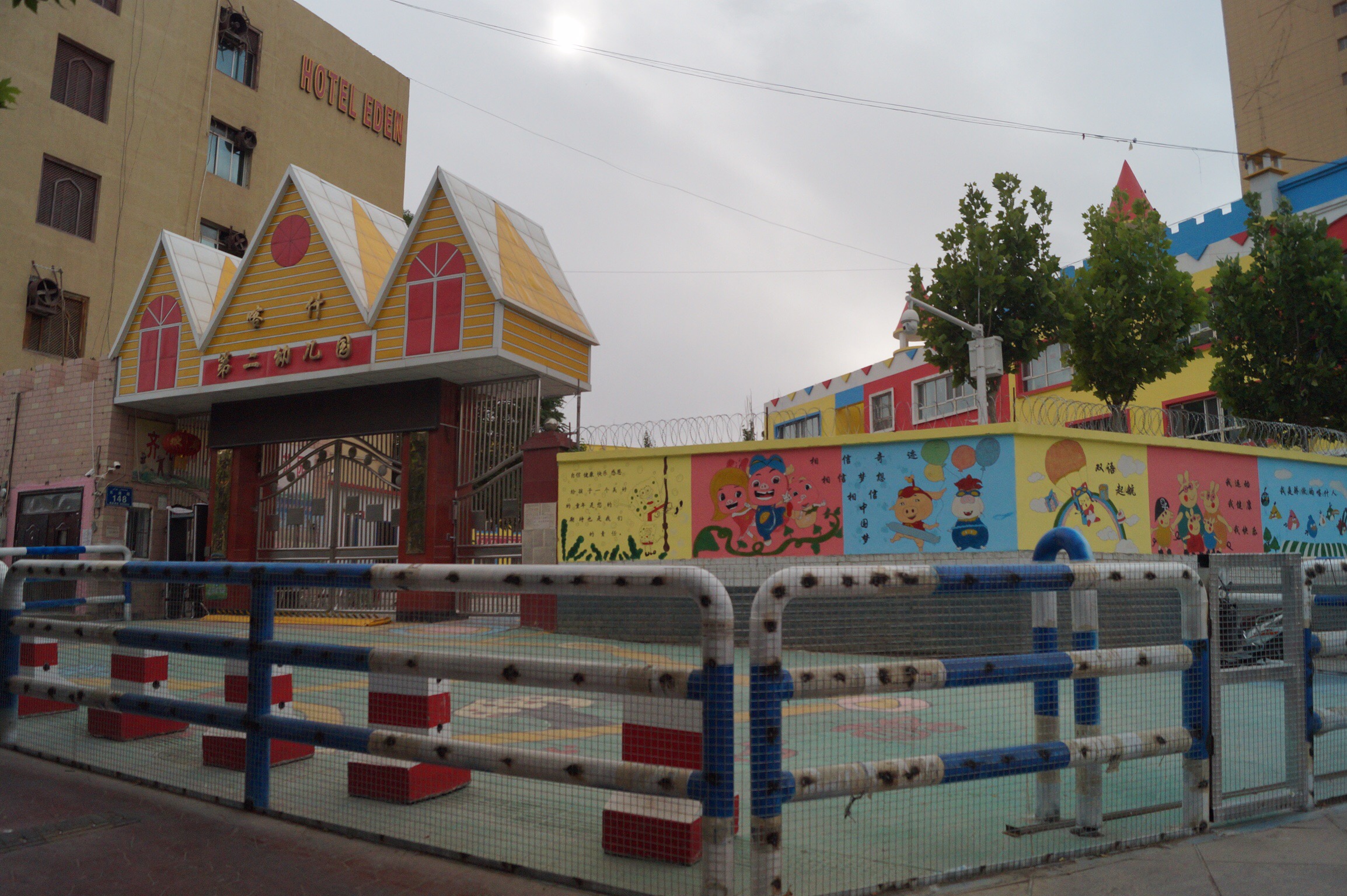
Even schools are barricaded like fortresses with armed guards when open, we weren't allowed to take any photos of the police or military.
The police checks both on the road and to in towns were oppressively omnipresent. However we never felt at all at threat from the local population who were trying the best they could under extreme stress to go about their everyday business. The agency we used had done a great job with the paperwork and our 5 different guides were brilliant at liaising with the police in such sensitive regions. Lhasa had as many police posts but the policemen were far more relaxed and although there appeared to be as many restrictions there seemed to be scope for the local police to use their discretion. This article from Reuters has some of the background behind the changes:
https://widerimage.reuters.com/story/uighur-heartland-transformed-into-security-state . The heavy handed approach and the lack of freedom really upset us, I just can't imagine what it is doing to the local population. It certainly isn't a "winning hearts and minds" approach to governance. Although all over Xinjiang, even way out in the desert miles from anywhere (except the frequent police posts) were huge propaganda posters.
Apart from the above we loved the rest of the experience, especially in Tibet. The beauty of the mountains and the deep spirituality of the people will last in my mind for a long time. It was such a privilege to visit such a unique and ancient place. Some of my favourite memories are of circumambulating Barkhor kora (pilgrimage circuit) in the evening. People smiling and welcoming us to walk amongst them as they prayerfully circuited the holy site. They were particularly pleased to see the girls, walking behind you could see the whispers go out and people turning and smiling towards them. The girl's presence brought out delighted faces and attempts at communication in a shared language of gestures and smiles.
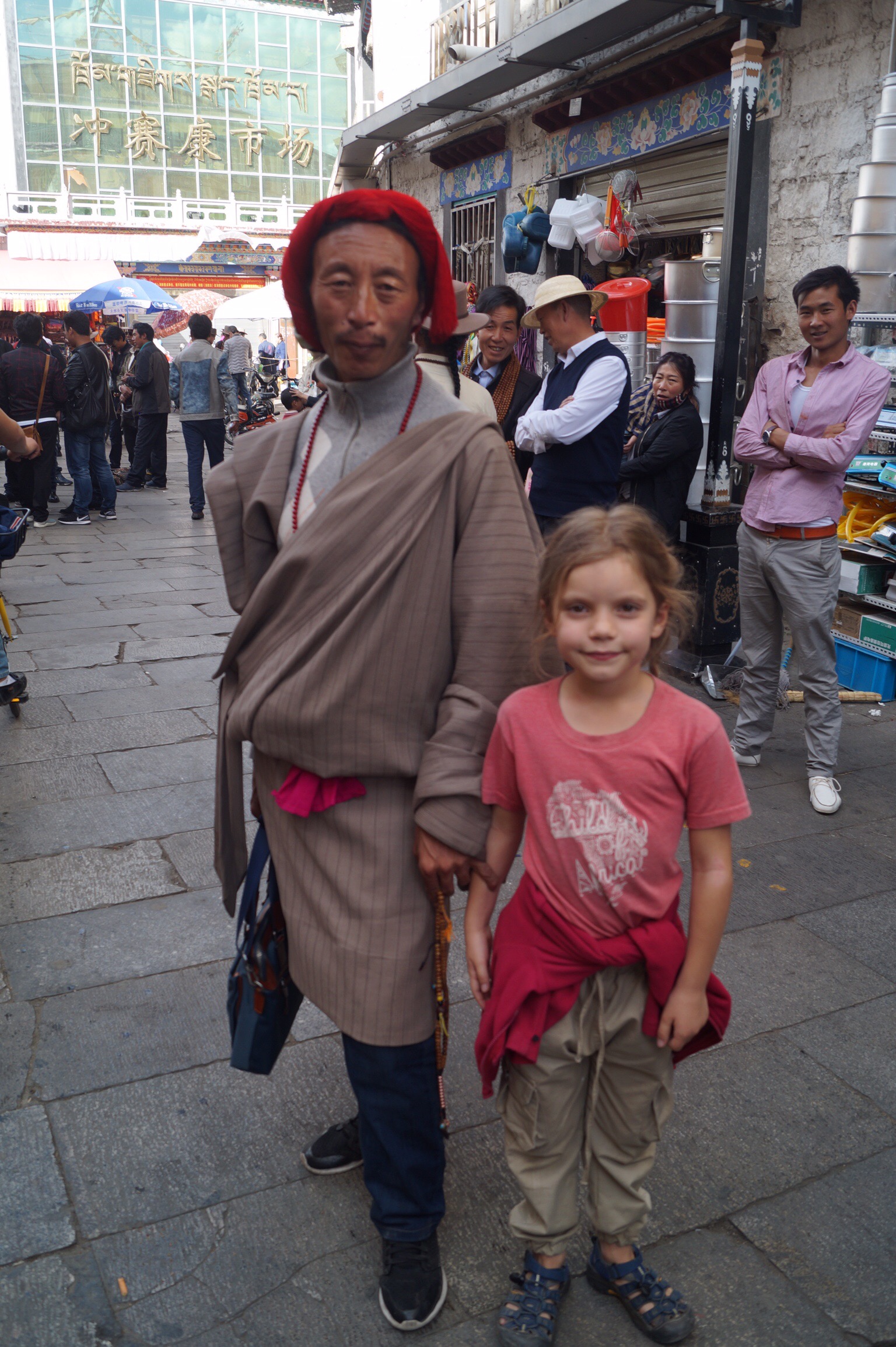
Despite the affects of altitude, I could happily spend much more time up in the high mountains. It was amazing to drive up to Everest Basecamp. We were so happy that neither the humans nor the truck suffered from bad altitude problems. It wasn't pleasant coming up so quickly onto the plateau, 3 really long days driving combined with concerns about altitude sickness was very stressful but thankfully none of us got anything serious.
China is making great leaps economically and developmentally, it is amazing to hear how quickly things are changing. It sounds like public works and roads are completed in record time even in inhospitable areas. All across the thousands of kilometres we drove through the Taklimakan on a smooth ribbon of tarmac, trees are being planted and irrigated along the roads, greening the desert.
Steve
Firstly I think I should say we have only really been in two provinces in China, Xinjiang and Tibet so our reflections are really regarding those provinces rather than China as a whole most of which I know from previous travels is quite different. We have spent almost a month in China and driven over 7,000kms yet we have only seen a fraction of China. It's been exhausting but exhilarating at the same time.
It's not easy or cheap getting into China with your own vehicle but it was all well organised and the guides we had were great especially having to put up with my frustrations at times.
The highlight for me was making Everest Base Camp and the scenery along the whole drive in Tibet was just fantastic. It was also interesting to visit the various monasteries and to see how Buddhism is still so important to the Tibetans.
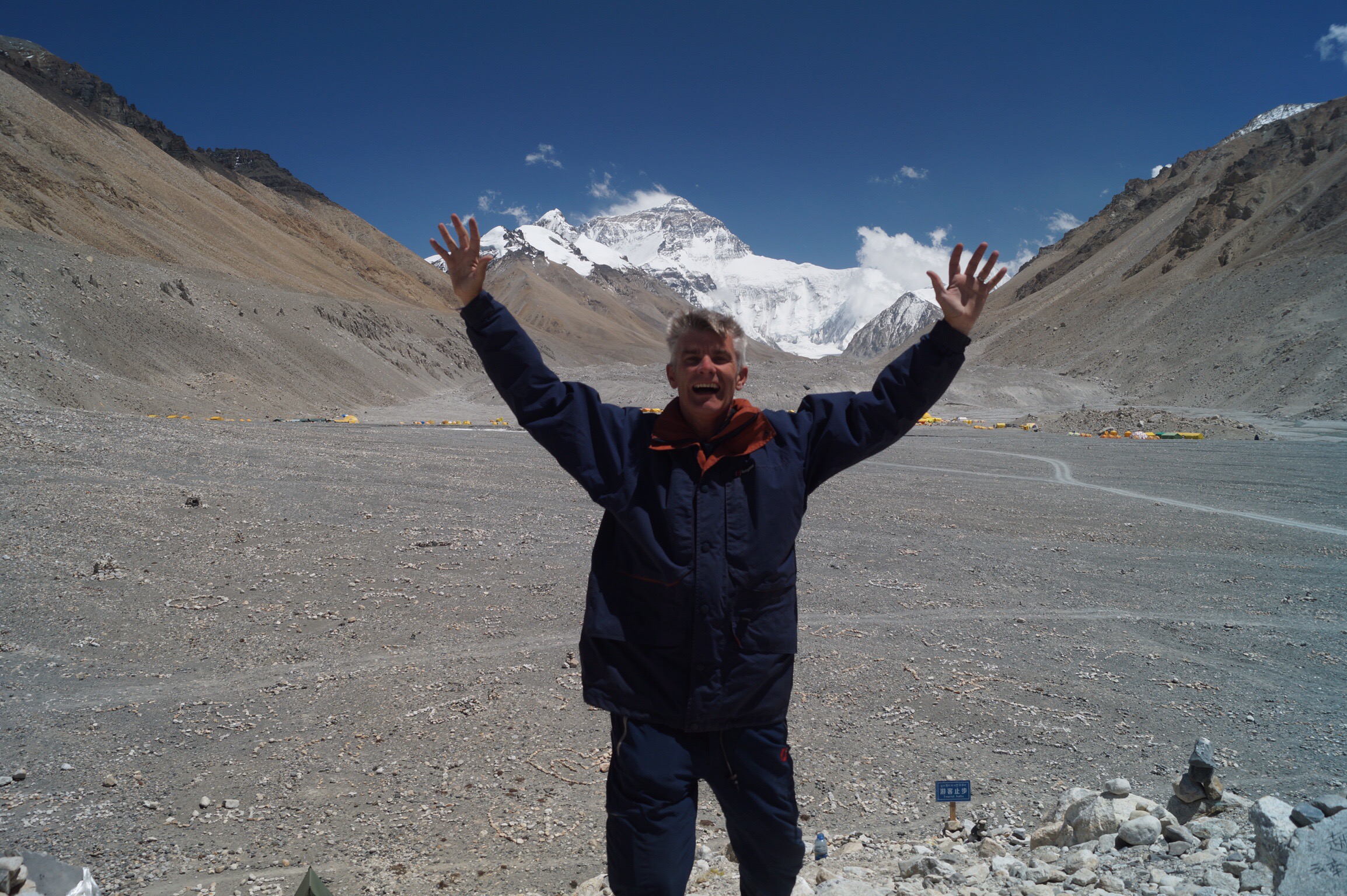
I wish I could say the same about the authorities. In all our travels we have never been subject to so many police checks, registrations etc. I know we are only tourists so it is much worse for the local population. The sufferings of the people in Tibet are well documented but we were surprised to see it in Xinjiang province too. Kashgar felt like a city that was occupied by an invading army. The authorities were keen that we did not see or know anything about this but the way they went about it really just highlighted the oppression. It really makes me appreciate the value of living in a free society and how important it is to retain those freedoms regardless of any terrorist or other threat.
Does a petrol station need to look like a military encampment?
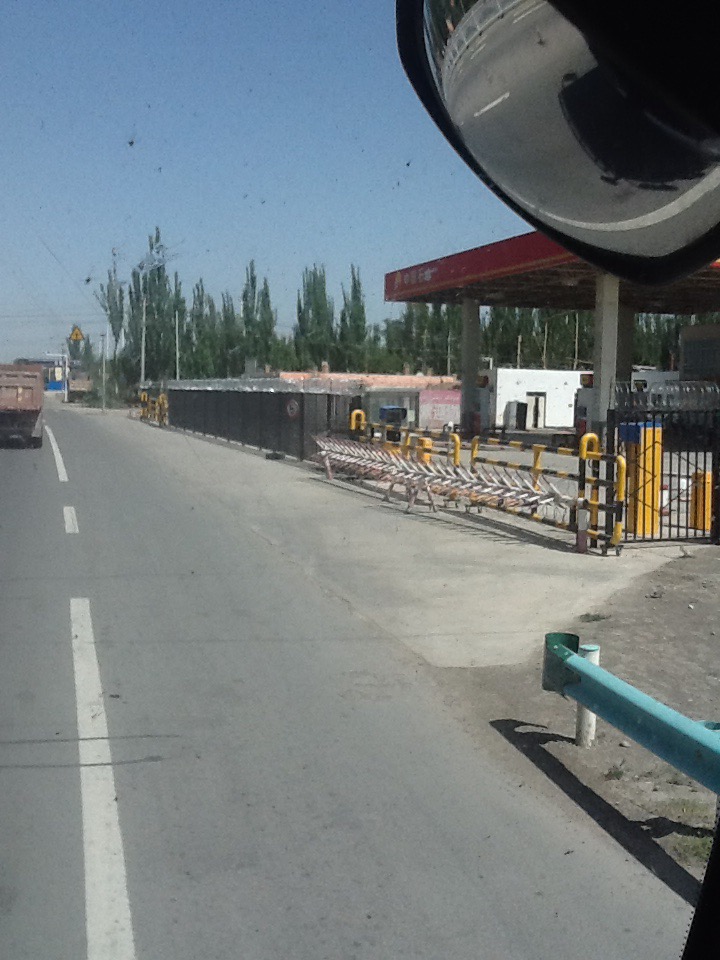
 Lucy
We entered the 'Stans with high hopes to see beautiful mosques, rugs, architecture and eat interesting foods. We had been studying the Silk Road so we knew about the history. I was hoping to see some camels laden with goods trekking across the desert. I would have loved to see it in its former glory with merchants bargaining in the markets and buying jade, silk, turquoise and carpets. It's called the Silk Road because that was the thing mostly traded with China. We saw some caravanasis where they stayed at night and yurts the official houses of the travelling nomads.
Lucy
We entered the 'Stans with high hopes to see beautiful mosques, rugs, architecture and eat interesting foods. We had been studying the Silk Road so we knew about the history. I was hoping to see some camels laden with goods trekking across the desert. I would have loved to see it in its former glory with merchants bargaining in the markets and buying jade, silk, turquoise and carpets. It's called the Silk Road because that was the thing mostly traded with China. We saw some caravanasis where they stayed at night and yurts the official houses of the travelling nomads.
 Mummy bought some blue tiles, just like they had on the buildings. They were very pretty, I liked bargaining like a real merchant.We went to a tea shop where they served nuts, raisins, sweets and tea. I loved the solid crystals of sugar they crunched with a sweet delicious flavour in my mouth.
Mummy bought some blue tiles, just like they had on the buildings. They were very pretty, I liked bargaining like a real merchant.We went to a tea shop where they served nuts, raisins, sweets and tea. I loved the solid crystals of sugar they crunched with a sweet delicious flavour in my mouth.
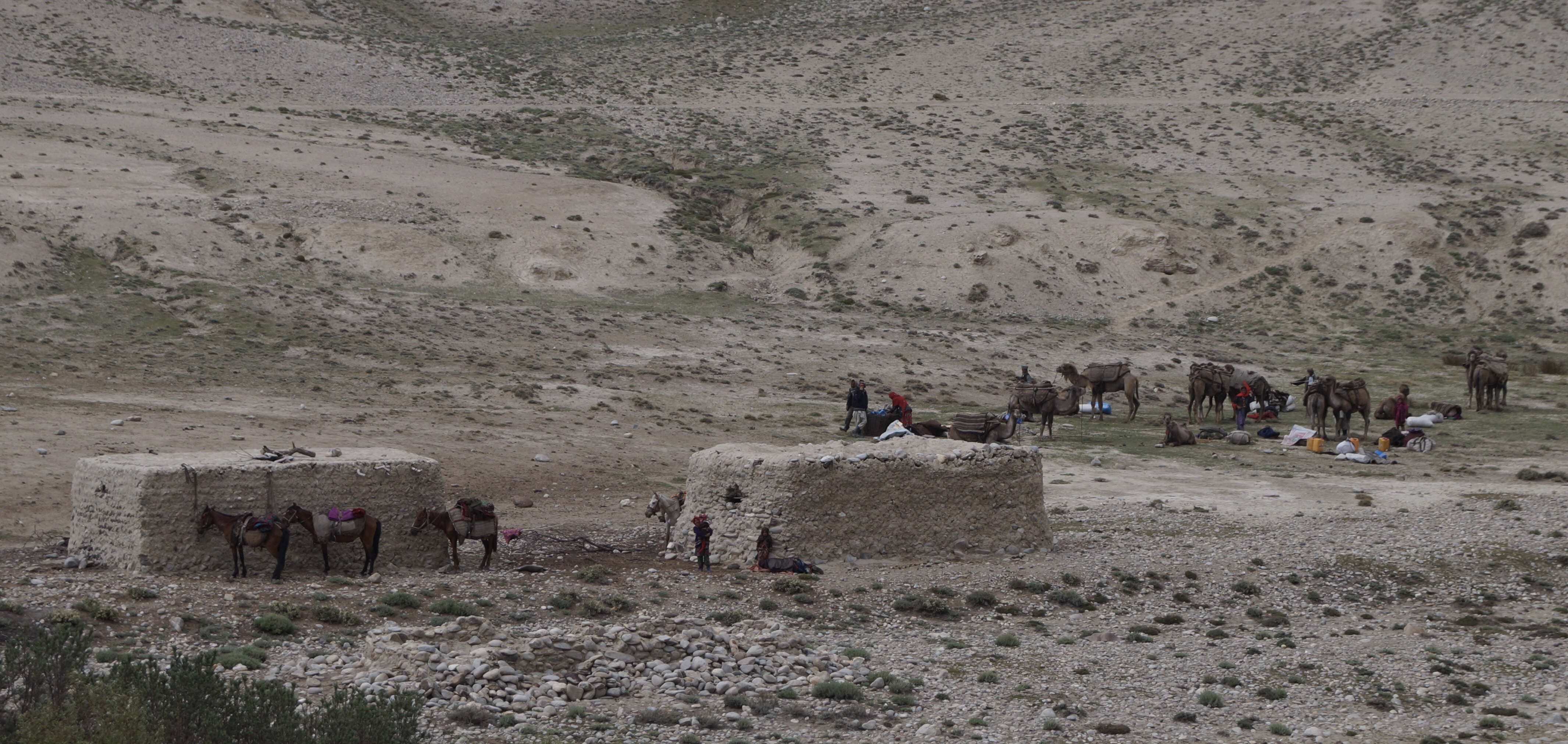 To leave Central Asia we had to cross the sea, I was sad to leave but I always knew we would have new adventures in the next place.
Alisha
From mountains in Kyrgyzstan and Tajikistan to mausoleums in Uzbekistan and deserts in Kazakstan. Central Asia is a riot of culture and traditions that are mixed into their modern lives you see herders with cell phones, yurts with satellite dishes and ancient mosques with security cameras.
To leave Central Asia we had to cross the sea, I was sad to leave but I always knew we would have new adventures in the next place.
Alisha
From mountains in Kyrgyzstan and Tajikistan to mausoleums in Uzbekistan and deserts in Kazakstan. Central Asia is a riot of culture and traditions that are mixed into their modern lives you see herders with cell phones, yurts with satellite dishes and ancient mosques with security cameras.
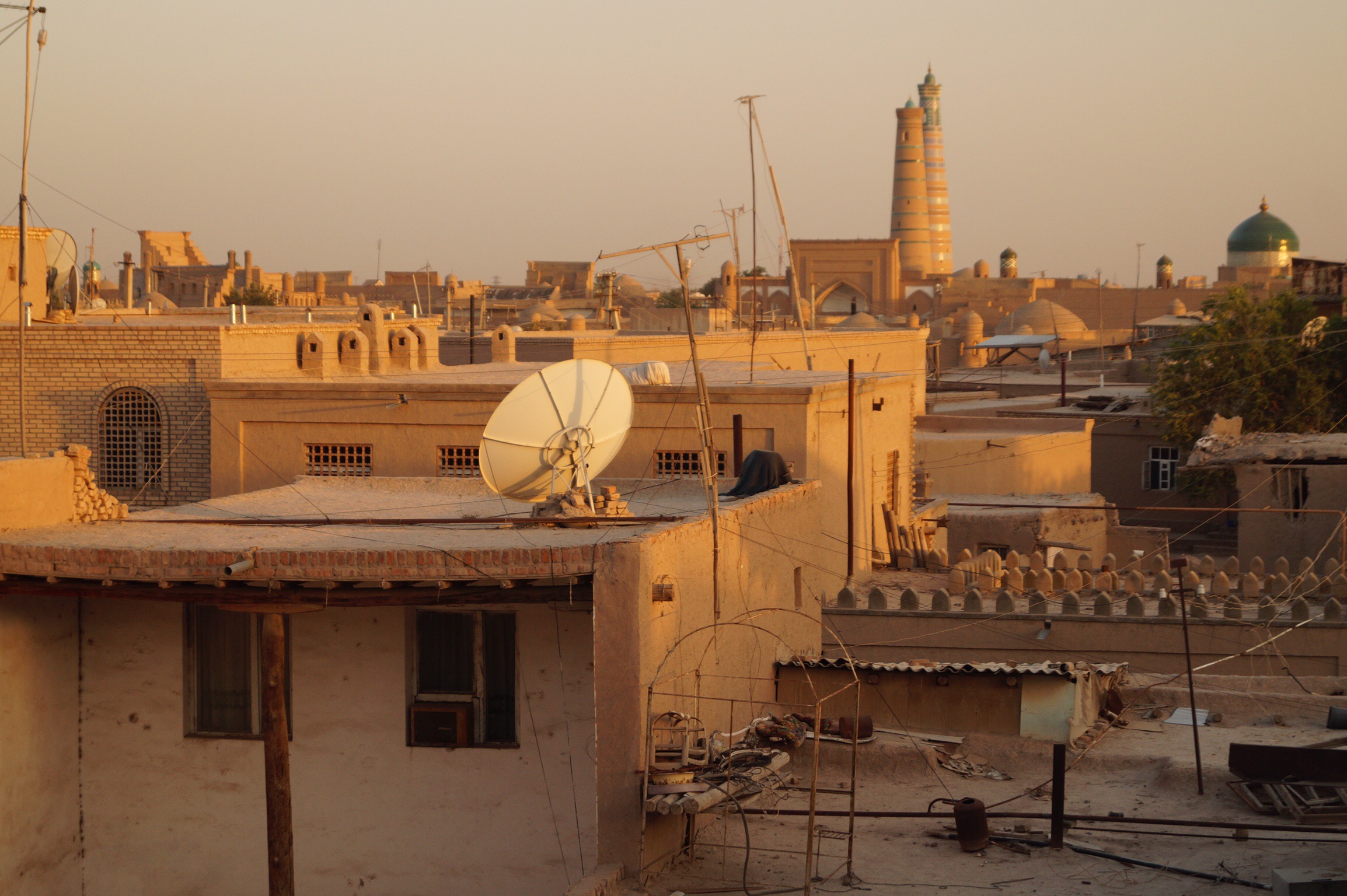 I enjoyed Kyrgyzstan because it was a nice cool place with mountains and difficult roads and just the sort of place strange people like us like to hang out. Tajikistan was much the same, it was funny being a stone's throw from Afghanistan (well a daddy's stone throw, I didn't quite make it). If I had to think of one word to describe Uzbekistan it would be HOT in the truck once it hit 54 degrees. If you want to feel 54 degrees then go into the hottest sauna ever and times the heat by a 100. If you haven't got a sauna then book a flight to Uzbekistan. Kazakstan wasn't so hot which was a relief but it was boring, landscape-wise, at least the bit we traveled through if you show me a picture of a bit we traveled through and a bit we didn't I wouldn't of been able to tell the difference.
I enjoyed Kyrgyzstan because it was a nice cool place with mountains and difficult roads and just the sort of place strange people like us like to hang out. Tajikistan was much the same, it was funny being a stone's throw from Afghanistan (well a daddy's stone throw, I didn't quite make it). If I had to think of one word to describe Uzbekistan it would be HOT in the truck once it hit 54 degrees. If you want to feel 54 degrees then go into the hottest sauna ever and times the heat by a 100. If you haven't got a sauna then book a flight to Uzbekistan. Kazakstan wasn't so hot which was a relief but it was boring, landscape-wise, at least the bit we traveled through if you show me a picture of a bit we traveled through and a bit we didn't I wouldn't of been able to tell the difference.
 In Uzbekistan I saw a few too many mosques, they where all blue-tiled and had a dome if you seen ten you've seen them all there is absolutely no need to see five million more.
Gilly
Melons are everywhere in Central Asia. Delicious and refreshing and piled up high on every street corner. Flat light bread still warm from the tandoor oven and mutton kebabs, served with salads made for delicious meals, with melon, of course, for desert. The 'Stans' shared Russian heritage made Steve and I nostalgic for our time in Moscow. While I will never enjoy dill liberally sprinkled on every single meal, we did search out some of our old favourite foods. Steve and Alisha embarked on a multinational search for authentic pelmeni (steamed meat dumplings), a mutual passion after sharing many a bowlful when Alisha was little.
In Uzbekistan I saw a few too many mosques, they where all blue-tiled and had a dome if you seen ten you've seen them all there is absolutely no need to see five million more.
Gilly
Melons are everywhere in Central Asia. Delicious and refreshing and piled up high on every street corner. Flat light bread still warm from the tandoor oven and mutton kebabs, served with salads made for delicious meals, with melon, of course, for desert. The 'Stans' shared Russian heritage made Steve and I nostalgic for our time in Moscow. While I will never enjoy dill liberally sprinkled on every single meal, we did search out some of our old favourite foods. Steve and Alisha embarked on a multinational search for authentic pelmeni (steamed meat dumplings), a mutual passion after sharing many a bowlful when Alisha was little.
 Although there is a lot to choose from, I thing for me the highlight was the Pamirs and the Wakhan Valley. Dramatic scenery; snow capped peaks; uninhabited wilderness; right next to a fascinating rogue state (which sadly I am never likely to visit); swollen rivers of snowmelt; and challenging roads made it an unforgettable part of the adventure.
Silk Road cities of Uzbekistan: Samarkand; Bukhara and Khiva all enthralled us with their historical significance and amazing architecture. Whilst I couldn't get enough of turquoise domes and blue tiled arched entrance ways, I could have done without the 45°C heatwave we had whilst we were there.
An unexpected perk of the need to register in a hotel for most of your nights in Uzbekistan (something that was never checked when we left) was meeting other travellers. Since trekking in Nepal, we have met very few other travellers and no other overlanders. Central Asia in the summer is quite popular with independent travellers, motorcyclists and especially long distance cyclists. It was also great to hangout with another overlanding family, our first since Africa, in Samarkand. It was also fun to pair up across the desert with Cate and Michael. At least with the catalogue of minor mechanical problems both the truck and Cate's bike had were easily fixed with many hands.
Although there is a lot to choose from, I thing for me the highlight was the Pamirs and the Wakhan Valley. Dramatic scenery; snow capped peaks; uninhabited wilderness; right next to a fascinating rogue state (which sadly I am never likely to visit); swollen rivers of snowmelt; and challenging roads made it an unforgettable part of the adventure.
Silk Road cities of Uzbekistan: Samarkand; Bukhara and Khiva all enthralled us with their historical significance and amazing architecture. Whilst I couldn't get enough of turquoise domes and blue tiled arched entrance ways, I could have done without the 45°C heatwave we had whilst we were there.
An unexpected perk of the need to register in a hotel for most of your nights in Uzbekistan (something that was never checked when we left) was meeting other travellers. Since trekking in Nepal, we have met very few other travellers and no other overlanders. Central Asia in the summer is quite popular with independent travellers, motorcyclists and especially long distance cyclists. It was also great to hangout with another overlanding family, our first since Africa, in Samarkand. It was also fun to pair up across the desert with Cate and Michael. At least with the catalogue of minor mechanical problems both the truck and Cate's bike had were easily fixed with many hands.
 Steve
There was a lot of diversity in Central Asia; from the mountains to the desert, from the cold to the heat, from the unusual to the familiar. After living in Russia many things seemed comfortingly familiar and yet there were also some striking differences. The people were warm and friendly and yet we managed to enjoy lots of time in solitude in beautiful settings.
Steve
There was a lot of diversity in Central Asia; from the mountains to the desert, from the cold to the heat, from the unusual to the familiar. After living in Russia many things seemed comfortingly familiar and yet there were also some striking differences. The people were warm and friendly and yet we managed to enjoy lots of time in solitude in beautiful settings.
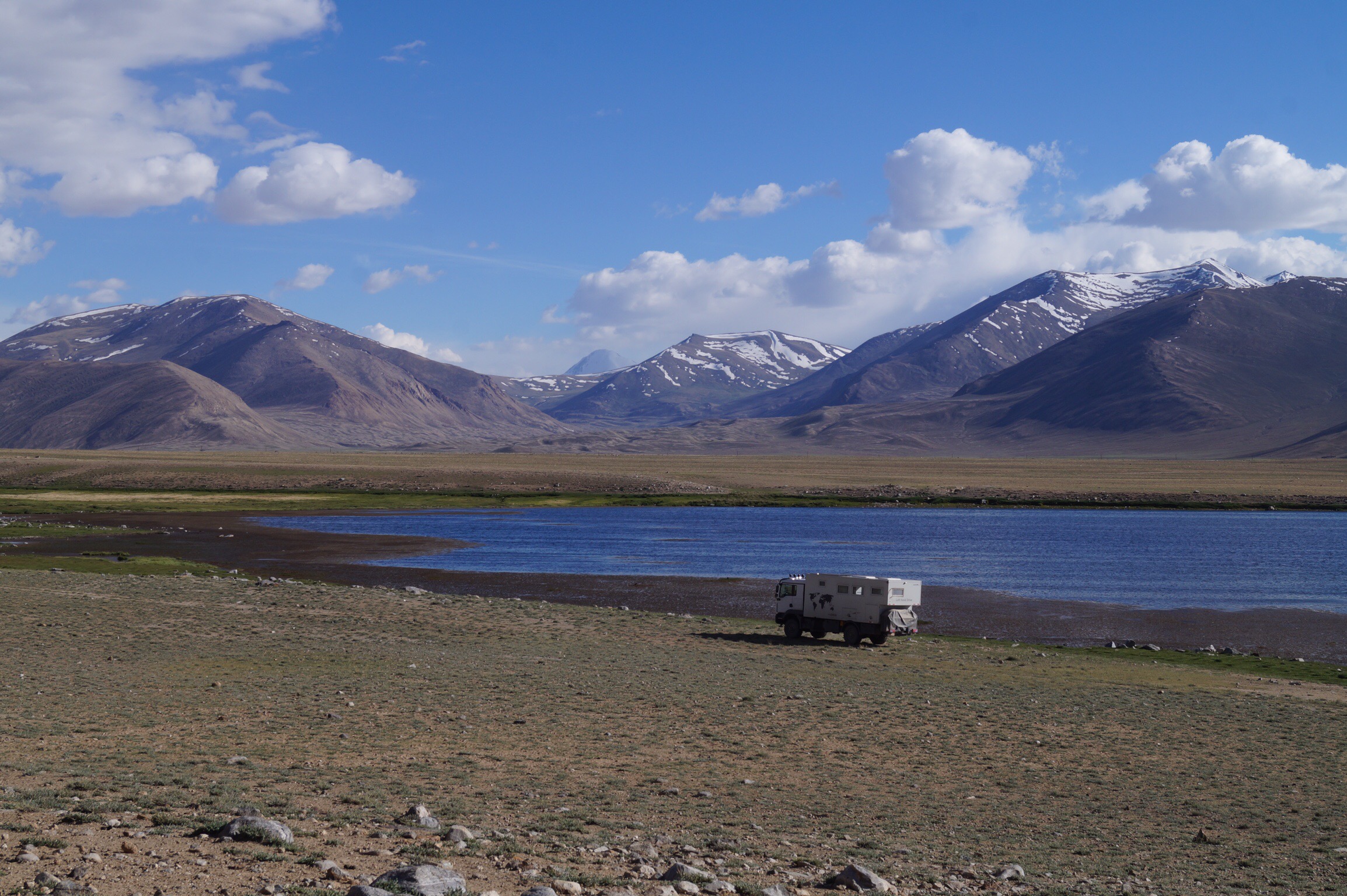 Kyrgyzstan was so green after the starkness of Xinjiang in China. Everywhere we went there was green meadows with running rivers and often the nomads with their yurts and horses camped for the summer. Tajikistan was more stark and rugged but the Pamir Highway and Wakhan corridor were barrenly beautiful with a raging river and pockets of green between it and Afghanistan. Uzbekistan was all about the ancient Silk Road cities. Whilst these have now been spruced up for tourism and at times felt a little soulless there is no denying the eye catching timeless beauty of the monuments. Even in the baking heat we just had to go out and see them again and again.
Kyrgyzstan was so green after the starkness of Xinjiang in China. Everywhere we went there was green meadows with running rivers and often the nomads with their yurts and horses camped for the summer. Tajikistan was more stark and rugged but the Pamir Highway and Wakhan corridor were barrenly beautiful with a raging river and pockets of green between it and Afghanistan. Uzbekistan was all about the ancient Silk Road cities. Whilst these have now been spruced up for tourism and at times felt a little soulless there is no denying the eye catching timeless beauty of the monuments. Even in the baking heat we just had to go out and see them again and again.
 We did not see a lot of Kazakhstan, mainly desert, but got to to camp there with new friends which was wonderful and saw some amazing sunsets. It was slightly surreal arriving at the Caspian Sea, an oil town and beach resort all rolled into one but one which allowed us a welcome break before the ferry crossing across the Caspian Sea.
Central Asia is a beautiful area of the world rich in diversity. We have met many more overlanders and long term travellers here than in other parts of Asia but it is still largely untouched by mass tourism and you really can get away from it all into areas of natural beauty.
We did not see a lot of Kazakhstan, mainly desert, but got to to camp there with new friends which was wonderful and saw some amazing sunsets. It was slightly surreal arriving at the Caspian Sea, an oil town and beach resort all rolled into one but one which allowed us a welcome break before the ferry crossing across the Caspian Sea.
Central Asia is a beautiful area of the world rich in diversity. We have met many more overlanders and long term travellers here than in other parts of Asia but it is still largely untouched by mass tourism and you really can get away from it all into areas of natural beauty. 









